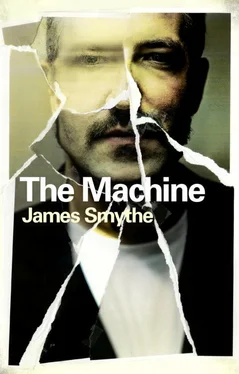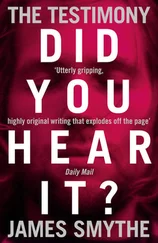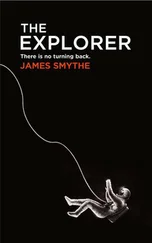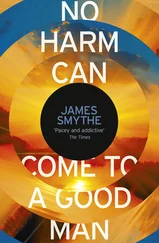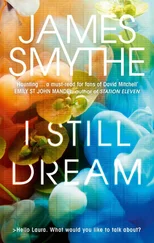She takes him to the bathroom and pulls his trousers down before making him sit, only he’s got an erection. She hasn’t seen him like this in years, and she knows it’s nothing – blood and muscle, involuntary, nothing to do with her – but she doesn’t want to be faced with it now, and she doesn’t know how to make it go away.
We’ll have to wait, she says. She knows that if he pisses now it’ll go everywhere – he used to apologize for it when he would wake up like this before, saying that he couldn’t control it, that it wasn’t his fault, that she should blame whoever came up with such a shitty design in the first place – so they stand there as nature does its thing. Minutes, and she doesn’t look. He’s not Vic again yet. She waits.
Afterwards, she puts him onto the bed. The writhing starts before she’s even turned the Machine on: as soon as the Crown goes onto his head he kicks out his legs and struggles. She thinks about binding his arms. This needs to be easier. She takes the branded, boxed pestle and mortar from the cupboard – a wedding gift, never used until now, something that they never understood when herbs and spices were so easy to buy pre-ground – and she tips a couple of the diazepam tablets and a couple of ibuprofen into the mortar. She crushes them together, round and round. She’s left with a thin white dust, so thin that it could almost just spill into the air. Like talc. She takes a small bottle of water from the fridge and unscrews the lid and tips the contents of the mortar bowl into it, then puts the lid on and shakes it. She stands by the fridge, shaking it.
She hopes that she’s doing the right thing. Would he be happy with her for this? Vic didn’t like tablets. Didn’t like painkillers, or anything that dulled him.
I like knowing exactly what’s wrong with me, he would say. Then, after the war, he no longer had a choice. Would he thank her for this?
Beth holds the bottle to his lips and helps tilt his head back. He drinks in gulps, no finesse. She’s the one who stops it from dribbling down his face, manoeuvring the bottle to almost make a seal.
There, she says. She crushes the bottle and puts it into the recycling bin and then stands in the kitchen, to wait. She doesn’t want to wait in there, because the Machine is waiting as well. The power is all back on – must be back on across the whole estate – so she opens the fridge and smells the milk, to check it’s okay. It smells fine. She puts the coffee machine on and makes herself breakfast: yoghurt in a bowl, a few spoonfuls of sugary jam on top. It’s not exactly appealing, but her stomach growls in acceptance. She’s eating the last few mouthfuls, one eye on Vic’s body, which has slumped down again of its own accord, when there’s a knocking on the door.
Beth, comes Laura’s voice through the letterbox. Beth, I know you’re in there. I can hear you, and the lights are on. Beth, come on. Answer the door.
Beth stays completely still. She puts the spoon down as softly as she can manage, in the bowl of yoghurt rather than on the side, to minimize noise, and she shuts herself down: breathing as quietly as possible.
Beth. Come on. The only words that have been spoken to her in four days, by a woman on the other side of the door, and they are the same words that Beth has been saying to herself. Beth, come on. What are you doing? Have you got him in there with you?
Beth watches the shape of Laura moving from frame to frame, from the frosted glass of the door to the clarity of the curtained window, as if she’s nothing more than a shadow. She raps on the doorframe and the window. She flaps the letterbox and her eye peers through. She says the same things over and over again.
I’ll wait, she says. I’ve got all day. It’s my summer as well.
You have to go home, Beth thinks. You’re not even from the island.
I’ll sit here and wait for you to open the door, because you have to, sooner or later. She’s not joking. The sound of her slumping down against the door comes in, and the sound of her opening something, chocolate or something, and of her humming a song that Beth almost recognizes. Something that the kids in the school sing, or have as their ringtones. Laura sings along after a while. Don’t, she sings, cos here it comes, here it comes. When you keep them down, when they pressin’ you down, you better save your own blood, because here it comes: here comes the flood. Her singing voice is reedy and half-uttered, but the words are clear as day through the opened windows. Beth thinks about the diazepam, which is probably set into the body’s system now. She looks into the bedroom as much as she can without moving her chair, and Vic’s body is asleep. The eyes are shut at least. She thinks about how it can just wear off. She’s probably got, what, four hours? Five? Before he’s back to wide awake, not dulled by the painkillers. That’s a window of opportunity she’ll lose if Laura really doesn’t leave.
Go away, she says.
What? The scuffle of Laura standing up, leaning her head close to the opened window.
I said go away. Please go away. I’m fine.
You’re not fine. You’re going to do something that you shouldn’t.
Don’t tell me what I shouldn’t do. Go away.
I’m waiting here until you let me in.
You can’t come in.
Don’t do this, Laura says.
Beth goes to the window and shuts it, slamming it so quickly that Laura doesn’t have a say in the matter. Laura presses the doorbell, so Beth goes to the box and turns the volume off. Laura hammers on the door, so Beth hammers back.
I’m not coming out, and you’re not coming in, Beth shouts. Leave us alone.
Us? Laura’s voice cracks. You’ve got him in there with you?
Just go away, Beth says. She sounds defeated, on purpose: hoping that Laura hears the sadness in her voice. She walks to the Machine’s room and shuts the door behind her. Slams it. She doesn’t know if Laura leaves or stays, but here she is with Vic. She turns the volume on the playback down, which means it’s going to be hard to hear over the grind when the Machine gets going. But regardless, she doesn’t want Laura to hear this.
The diazepam has done its job, and he’s pliable. She slips the Crown onto his head and he hardly murmurs, and then she presses play on the first file she’s got lined up for the day. The Machine’s noise, she wonders where it’s gone. She can still hear it, but it’s like it’s hardly there, or it’s part of the background. She remembers being a child, when they – her whole family – moved to a house in west London that was next to the underground. The first few nights the trains kept her awake: bedtime meant the sound of the brakes and the engines as they came in and out of the station at the foot of her garden; and then there was the sound of the planes from overhead, the flight path directly intersecting with where she lived, coming and going at all times. They made more noise on the way up, she thought, as she watched the lights through the darkness. But she got used to it. Three nights of watching the planes, and waiting for the last train to pass through, and that was it. No more. As a child she told her parents that she had done it herself.
I wished that they would stop, she told them. So I wouldn’t be able to hear them any more.
Now, the Machine is there, but somehow it’s lower, inside her. Like the noise is synchronous with herself: with her headache, which throbs incessantly as she stands near the Machine, and the rumble in her gut, which she takes to be hunger but which edges towards nausea. But then she looks at Vic as the playback occurs and he seems more whole. He’s getting there, she tells herself; a construction site, with signs up and barricades, but he’s getting there.
Читать дальше
Конец ознакомительного отрывка
Купить книгу
